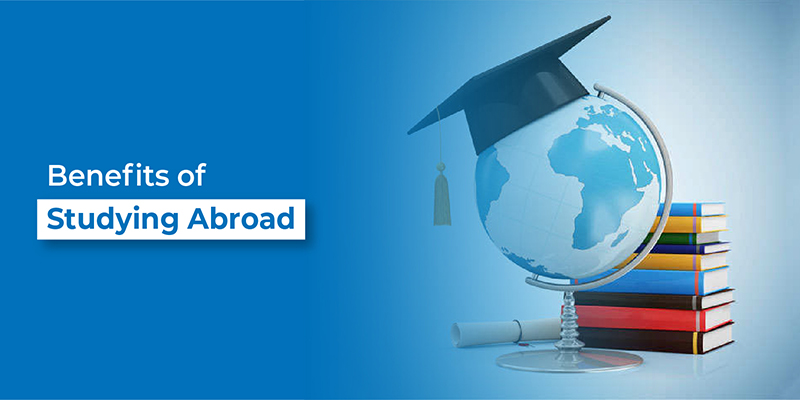Studying abroad can be a life-changing experience for students, but it comes with its own set of benefits and challenges. In this comprehensive guide, we will explore the advantages and drawbacks of studying abroad and provide tips for students on how to make the most of their experience.
Studying abroad can be an exciting and rewarding experience for students. It provides them with an opportunity to immerse themselves in a new culture, gain a new perspective on the world, and expand their academic and personal horizons.
However, studying abroad also comes with its own set of challenges, such as adjusting to a new environment, navigating cultural differences, and managing homesickness. In this guide, we will explore the benefits and challenges of studying abroad and provide tips for students on how to make the most of their experience.
Benefits of Studying Abroad:
Studying abroad can be a life-changing experience that offers many benefits.

Here are some of the key advantages of studying abroad:
- Cultural Immersion: Studying abroad provides an opportunity to immerse yourself in a new culture and gain a deeper understanding of another way of life. This can broaden your perspective and increase your empathy and tolerance for different cultures and ways of thinking.
- Language Acquisition: Studying abroad also provides an opportunity to learn or improve your language skills. Being fully immersed in a language can accelerate your learning and give you a more authentic understanding of the language and culture.
- Personal Development: Studying abroad can help you develop independence, confidence, and resilience. Being away from home and in a new environment forces you to adapt to new situations, problem-solve, and become more self-sufficient.
- Career Advancement: Studying abroad can give you a competitive edge in the job market. It demonstrates your adaptability, global awareness, and cross-cultural communication skills, all of which are highly valued by employers in today’s global economy.
- Networking: Studying abroad also provides an opportunity to build a global network of contacts, including fellow students, professors, and local contacts. This network can be invaluable for future career opportunities and personal growth.
- Academic Excellence: Studying abroad can also offer access to academic programs and resources that are not available at your home institution. This can provide a unique academic experience that enhances your learning and intellectual growth.
- Adventure and Fun: Studying abroad can also be a lot of fun! It offers an opportunity to travel, try new foods, and experience new activities and adventures that you may not have otherwise had the chance to do.
Overall, studying abroad offers a unique opportunity for personal and academic growth, as well as cultural immersion and networking. It is an experience that can open doors to new opportunities and broaden your horizons in countless ways.
Challenges of Studying Abroad:
- Culture Shock: Adjusting to a new culture can be challenging, and students may experience culture shock, homesickness, and loneliness.
- Language Barriers: Communication can be challenging in a new language, and students may struggle to communicate with locals or understand lectures.
- Academic Differences: Academic systems can vary widely from country to country, and students may find it difficult to adapt to new teaching styles, coursework, and grading systems.
- Financial Strain: Studying abroad can be expensive, and students may face a financial strain, especially if they are not prepared for the cost of living in a new country.
- Safety Concerns: Studying abroad can also come with safety concerns, such as navigating unfamiliar neighborhoods or facing discrimination.
Tips for Studying Abroad:
Studying abroad is an exciting and rewarding experience, but it also comes with its own set of challenges. To make the most of your experience, it is important to be prepared and proactive.

Here are some tips for studying abroad:
- Research: Before you leave for your study abroad program, do your research on the country, culture, and academic system you will be experiencing. This will give you a better understanding of what to expect and help you adjust more quickly once you arrive.
- Plan Ahead: Studying abroad requires planning, both in terms of logistics and finances. Start planning well in advance to ensure you have everything you need for a successful trip. This includes arranging your travel, securing your visa, and setting up your living arrangements.
- Build a Support Network: Studying abroad can be challenging, especially if you are far away from friends and family. Build a support network that includes other students, professors, and local contacts who can help you navigate the challenges of studying abroad.
- Embrace the Culture: Immerse yourself in the local culture by trying new foods, attending cultural events, and exploring your surroundings. This will help you gain a deeper understanding of the country and its people.
- Learn the Language: Learning the local language can enhance your experience and help you navigate the culture more easily. Take language classes or practice with locals to improve your language skills.
- Manage Homesickness: Homesickness is common among students studying abroad. Stay in touch with friends and family back home, but also make an effort to build a new support network and get involved in activities on campus to keep yourself busy and engaged.
- Stay Safe: Studying abroad can come with safety concerns, such as navigating unfamiliar neighborhoods or facing discrimination. Take precautions to stay safe, such as avoiding dangerous areas, staying aware of your surroundings, and following the local customs and laws.
By following these tips, you can make the most of your study abroad experience and come away with a deeper understanding of the world and yourself. Remember to stay open-minded, be flexible, and embrace the challenges and opportunities that studying abroad presents.
Conclusion:
Studying abroad can be an enriching and transformative experience for students, but it also comes with its own set of challenges. By understanding the benefits and drawbacks of studying abroad and following these tips, students can make the most of their experience and come away with a deeper understanding of the world and themselves.





